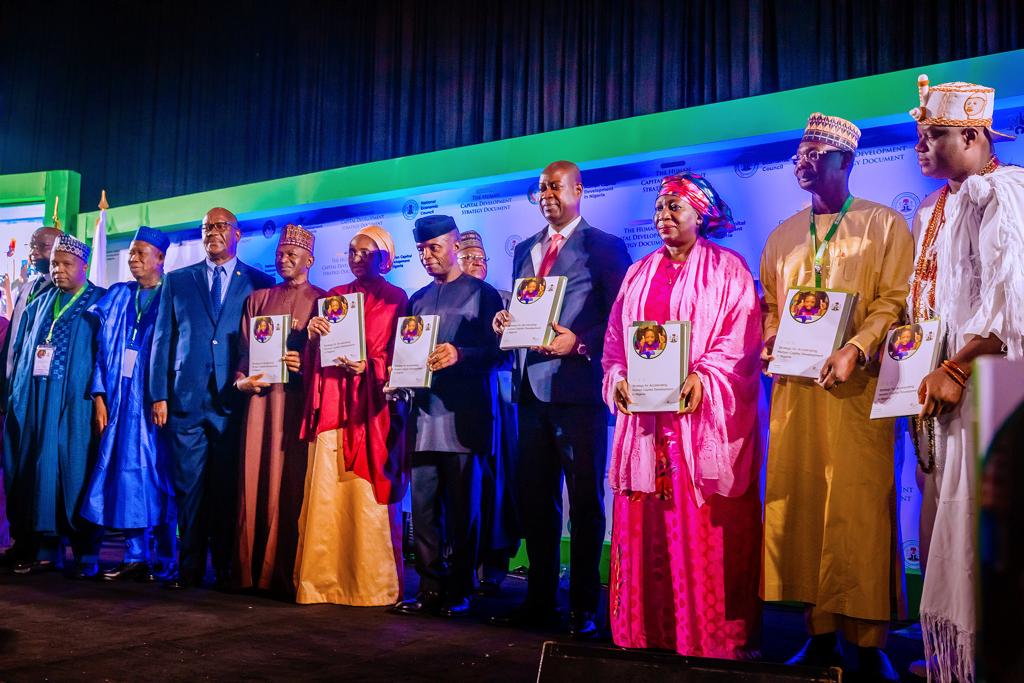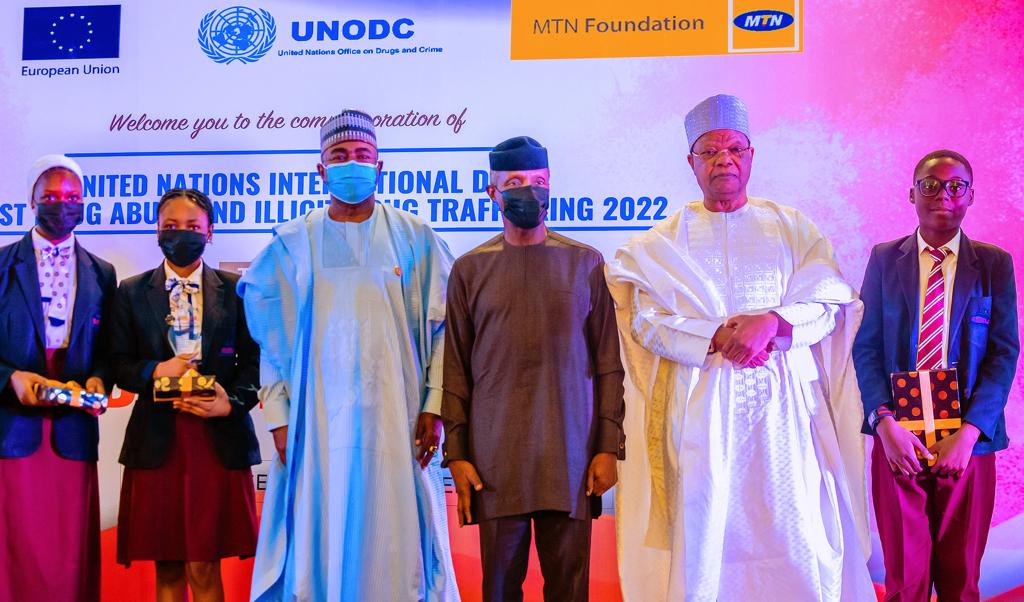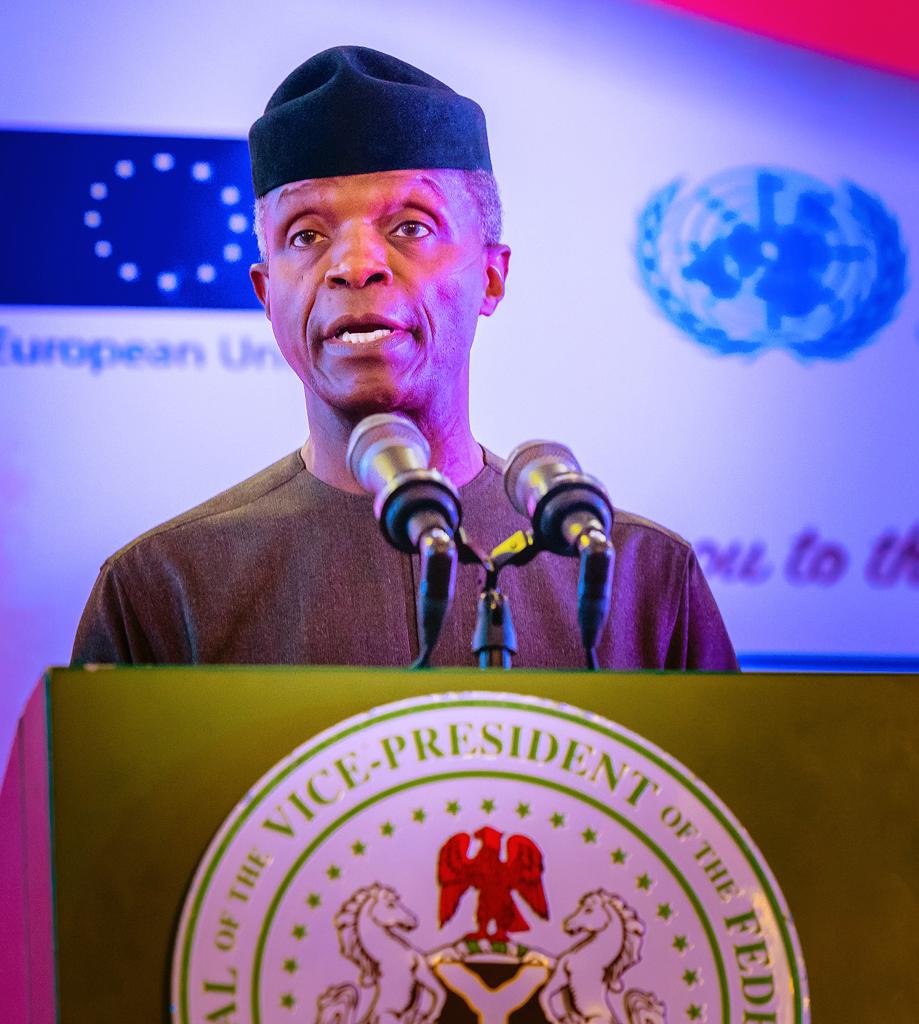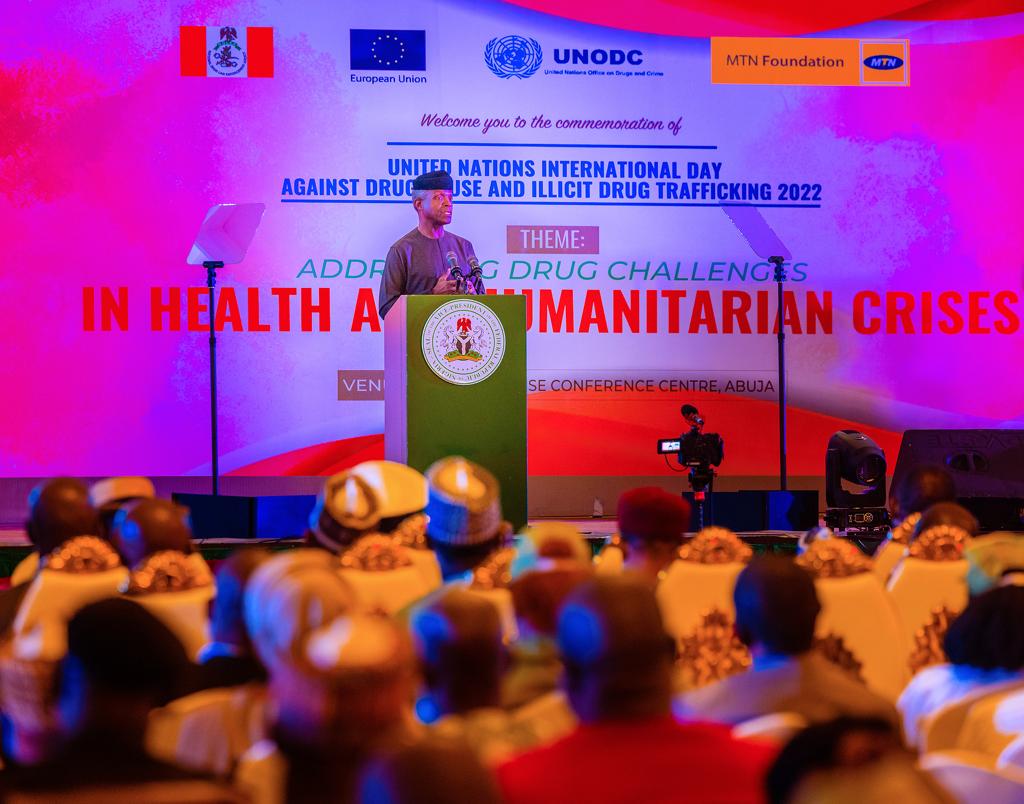Commemoration Of The 2022 United Nations International Day Against Drug Abuse & Illicit Drug Trafficking
KEYNOTE ADDRESS BY HIS EXCELLENCY, PROF. YEMI OSINBAJO, GCON, SAN, VICE PRESIDENT OF THE FEDERAL REPUBLIC OF NIGERIA AT THE COMMEMORATION OF THE 2022 UNITED NATIONS INTERNATIONAL DAY AGAINST DRUG ABUSE AND ILLICIT DRUG TRAFFICKING AT THE OLD BANQUET HALL ON THE 27TH OF JUNE, 2022
PROTOCOLS
I am honoured to join you today at this year’s United Nations International Day Against Drug Abuse and Illicit Drug Trafficking. The observance of the day goes beyond rituals, and it is a highly important commemoration of the joint, solemn and unwavering commitment of UN Member Nations to take and strengthen action towards achieving a world free of drugs.
This is an important objective indeed, drug abuse has become a global public health and socio-economic challenge, and it places a huge burden as all of us have heard already, on our healthcare system and it portends grave consequences for our young people and the productivity of our labour force; and undermines the security of our communities.
The UN Office on Drugs and Crime (UNODC) reports that drug use was responsible for the death of almost half a million people in 2019 and drug use disorders resulted in the loss of 18 million years of healthy life. The 2018 National Drug Use Survey also revealed that in Nigeria at the time, there were about 14.3 million drug users, of which close to 3 million suffered from drug use disorders. This figure represents a 14.4% prevalence rate in Nigeria, which is about three times the global prevalence rate of 5%.
The UNODC in its 2021 World Drug Report projects that by 2030, the number of people using drugs around the world will rise by 11 per cent, and by 40 percent in Africa alone. This is a disturbing projection because as the country with the largest population in Africa, this implies that Nigeria’s drug abuse prevalence will rise substantially especially considering the proportions that we are leaders in terms of population.
In the past seventeen months, the NDLEA we are told has recorded over 17,647 arrests of offenders including 10 drug barons, but I am sure that number increases every day if you are following the news. With over 2,369 convicted persons and over 154,667.3kg of drugs were seized within this same period. Statistics show that about 5.5 per cent of the population aged between 15 and 64 years used drugs at least once in 2019. This is precisely the age bracket we cannot afford to lose to drug abuse.
Looking at the theme of this year’s UN International Day Against Drug Abuse and Illicit Drug Trafficking, it turns our attention to a rather different dimension of the problem. This is “Addressing Drug Challenges in Health and Humanitarian Crises” – increasing trends of drug abuse in areas of conflict and in post-conflict settings such as IDP and refugee camps. And this is of special concern to Nigeria as we are in the throes of civil conflict and terrorism resulting in the displacement of large numbers of our population.
The problem is a hydra-headed one.
First, conflict and instability undermine domestic law enforcement and compromise border controls which makes the smuggling of drugs easier.
Second, is that young people, usually the most vulnerable to drug use also form the majority of armed combatants and not surprisingly, there is the widespread use of drugs by these terrorists, and of course, as we have heard from the Chairman of NDLEA, many of these criminal armed groups use drugs extensively.
Indeed, some studies have shown that after controlling for armed groups and individual-level variables, drug intake and alcohol consumption sharply increase the violent actions perpetrated during conflicts.
The third is the triple jeopardy suffered by displaced persons; those in IDP camps and refugee camps. There is the trauma and stress of displacement, its immediate consequences, unemployment, and coping with new cultures, loss of self-esteem and hope and these displaced persons are at greater risk of substance abuse.
For women and girls, in particular, the situation is more harrowing. They are exposed to severe traumatic situations due to violence and sometimes sexual exploitation, especially in camps, which together with other stressful factors of displacement can lead to drug use.
These problems are worsened by the expected lack of access to treatment and therapies for drug abuse in refugee or IDP camps. The UN has since 2004, drawn the attention of all its Member States to this problem, its dimensions and possible remedies. In a resolution of the Economic and Social Council (ECOSOC) in that year, the UN said that for Drug Control and related Crime Prevention Assistance for countries emerging from conflict, special attention must be paid to it and the whole range of the problems from the general population especially those related to vulnerable groups, including combatants and non-combatants.
The Council called for action to strengthen drug control measures by dealing with both the supply and demand ends of the problem. The Federal Government has also taken both specific and general actions over the past seven years and all the efforts have been directed to control and deal with the menace of illicit drug trafficking in Nigeria in particular. These actions include adopting a synergized and multi-agency approach, the government has deployed counterterrorism and counter-narcotics initiatives, led by the NDLEA, which have successfully disrupted several high-profile drug networks.
And as part of these efforts, with funding from the European Union and technical support from the UNODC, relevant MDAs, and civil society organizations, we rolled out the National Drug Control Master Plan (NDCMP) for 2021-2025. This plan leverages an extensive evidence base, including the very first National Drug Use Survey which was conducted by the National Bureau of Statistics in 2018.
The Master plan adopts a comprehensive and inclusive approach to addressing issues of drug supply reduction and issues of drug abuse. It stands on four thematic pillars: drug supply reduction, demand reduction, access to drugs for medical purposes, and governance and coordination.
The plan is not just an approach majorly targeted at drug supply reduction, it is more balanced and is much more health-centred and looks at drug control not just from the point of view of abuse, but also from the health perspective.
A year ago also, President Muhammadu Buhari launched the War Against Drug Abuse (WADA) — an advocacy campaign designed to create awareness and propagate an anti-drug culture in Nigeria. This initiative involved the setting up of coordinated anti-drug committees in various States, various Local Government Areas and communities across the Federation.
The President also approved the recruitment of an additional 5000 personnel to enable the NDLEA to extend special commands across all local governments. I think it is fitting to mention and I am sure it is obvious to all, that in the National Drug Law Enforcement Agency (NDLEA) especially in the last two years, under the dynamic leadership of General Buba Marwa, the NDLEA Chairman, it has been fiercer and sharper in its determination to stamp out drug abuse and trafficking in the country. His vision and strong resolve have given the war against drug trafficking and abuse new energy, purpose and clearer direction.
While a great deal of effort has been invested into fighting drug abuse in Nigeria and a huge level of success has been recorded and I am sure we have seen from the figures, that the sheer number will tell us that much has been done, it is still evident that we have a lot of ground to cover.
The number of drug trafficking cases reported this past week proves that there is even much more illicit drug activity going on. Every time you arrest one or two people it does show that there is a problem.
The express vision of the NDLEA goes beyond apprehending more drug criminals and convicting them. We must deepen the effort and it is very clear that we are not just apprehending but also stamping this drug trafficking and drug abuse out completely. Relentlessly breaking illicit drug supply chains and distribution all over the country; discouraging drug use through intensive outreach and sensitization, and also promptly prosecuting traffickers. But above all, we must intensify rehabilitation of drug addicts, because what we are faced with is indeed a public health crisis — a crisis that is taking lives, destroying families and shattering communities.
I am glad to hear that in 2021, about 8,000 drug users were counselled and rehabilitated by the NDLEA, and in the first half of this year alone, over 11,000 drug users have been counselled and treated.
We must maintain a multi-dimensional and holistic approach and holistic approach to tackling drug abuse. It is true that the COVID-19 Pandemic accelerated drug use across the world was experienced, especially in rural areas, with many resorting to drug abuse and other negative coping mechanisms due to the lockdowns and socio-economic shocks. Access to illicit drugs became easier with online sales and contactless drug transactions, both influenced by the pandemic.
But the new normal still offers us opportunities for increased innovation in tackling this menace, especially through the use of technology-based monitoring systems for promptly detecting and addressing drug market changes; and also accelerating mobile outreach programmes, remote consultations, and treatment for those who suffer from drug use disorders and who do not have appropriate care.
As much as the Federal Government through its agencies and the state governments would lead the charge with decisive policy initiatives, these strides must be complemented by changes at the family and community levels.
The kind of change we seek regarding drug abuse cannot happen without the collaboration of families, faith-based organizations and community leadership at the local levels. We must spearhead massive value reorientation across the country, reassessing cultural factors and systems that support drug abuse and trafficking. Our communities everywhere must rise to this challenge.
The Federal Government will continue to support the NDLEA to fulfil its mandate, especially through new data-driven and evidence-based policy making, we will continue to unearth enduring and sustainable solutions to the underlying causes of drug abuse.
Once again, let me commend the new, dynamic and greatly improved NDLEA, and appreciate the very gallant officers for their service to our country.
We must also appreciate our development partners for the successes recorded so far and for their firm resolution to support the effort to ensure a clean and drug-free Nigeria. We are winning this war and there is no question at all that the days of the scourge of drug abuse and trafficking and dependency are clearly numbered. But it will involve even greater investment in focus and determination for the long haul.
Thank you very much for listening and God bless you.







